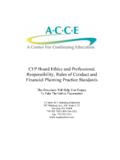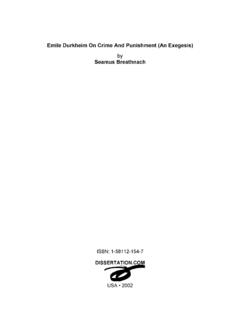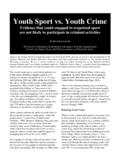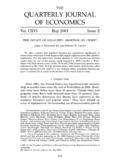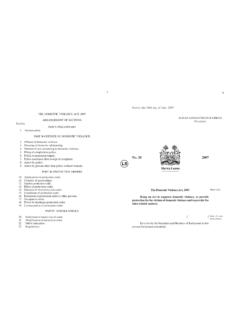Transcription of CFP Code of Ethics Exam Study Guide - …
1 CFP code of Ethics Exam Study Guide This document contains the questions that will be on the exam. When you have studied the course materials, reviewed the questions in this document, and feel that you are ready to take the exam, return to the login page to take the online exam. A Center for Continuing Education 707 Whitlock Ave, SW, Suite C-27. Marietta, GA 30064. 770-702-7917 | 800-344-1921. Fax: 770-702-7914. CFP code of Ethics Final Exam Study Guide Page 1. CFP code of Ethics Final Exam Study Guide Page 2. CFP code of Ethics Exam 1. The Fairness Principle requires impartiality and intellectual honesty. To uphold this principle, the certificant must: a. Express personal feelings to help the client meet objectives b. Treat the client as he or she would want to be treated c. Consider the wishes of the client's family d.
2 Consider the benefits to client's employers, partners or co-owners 2. Advertising by a certificant should: a. Not exaggerate the size or scope of the certificant's practice b. Elaborate whatever expectations for the certificant's services seem reasonable c. Never include both TV and live speeches at the same time d. Indicate that the certificant has the full support of his or her views by the CFP. Board 3. As defined under Principle 7, Diligence requires: a. At least yearly monitoring of the client's plan b. Semi-annual revision of the client's plan c. Monthly contact with the client d. Thorough and prompt handling of client transactions 4. Certificants must complete continuing education requirements as set by the CFP Board, to include: a. Only two hours every year addressing the Standards of Professional Conduct b.
3 30 hours, in topics of interest to the certificant every two years c. 32 hour every two years d. 30 hours, with a minimum of two hours addressing Standards of Professional Conduct 5. In determining if the certificant is providing financial planning, issues to consider include: a. Client's lack of intent to engage certificant's services b. How many financial planning services are involved c. Amount of data collected d. All of the above 6. CFP Board has defined how many steps in the financial planning process? a. 4. b. 7. c. 6. d. It depends on the scope of the relationship 7. Of the Seven Principles of Ethics , which one of the following applies: a. Integrity demands that the certificant disclose a difference of opinion b. Objectivity applies only to a certificant who has established a financial planning relationship in writing c.
4 Competence demands that the certificant recognizes the need for consultation with other professionals d. A certificant is not required to work with other financial professionals CFP code of Ethics Final Exam Study Guide Page 3. 8. Establishing and defining the client/financial planner relationship consists of each of following except: a. Disclosing material conflicts of interest b. Establishing the duration of the engagement c. Identifying the services to be provided d. An explanation of administrative and other investment fees 9. To implement the financial planning process, the certificant must first: a. Gather client data to see if the need for planning exists b. Analyze client's tax returns and financial status c. Meet with client and spouse d. Define the client/planner relationship 10. CFP Board defines certificant and professional eligible for reinstatement as: a.
5 The same; the terms can be used interchangeably b. A certificant is an existing CFP professional and a professional eligible for reinstatement never was c. A professional eligible for reinstatement is a current CFP certificate holder, a certificant is getting ready to take his or her final exam d. A certificant holds the CFP designation, a professional eligible for reinstatement did at some point in the past. 11. What is the subject of Principle 1 of the code ? a. Competence b. Fairness c. Objectivity d. Integrity 12. If a certificant determines there may be a possible conflict of interest, he or she must: a. Inform the client he or she can not work with them because of the conflict b. Inform the client and continue the financial planning relationship c. Discuss the conflict, possibly put it in writing and consider whether it is in the best interest of the client to work with the advisor despite the conflict d.
6 Do nothing until he or she is certain of the conflict of interest 13. Under what circumstances should a certificant breach Category 3 of the Rules of Conduct; Client Confidentiality a. As the result of a legal inquiry b. When defending charges of wrongdoing c. In connection with a civil dispute d. All of the above 14. Disclosing conflicts of interest fall under which Principle of Ethics ? a. Fairness b. Objectivity c. Professionalism d. None of the above CFP code of Ethics Final Exam Study Guide Page 4. 15. The code of Ethics includes both Principles and Rules. Together they: a. Provide very specific principles of professional ideals to be used in all activities. b. Explain the meaning of each principle as subjective and to be used by certificant according to his or her interpretation c. Provide standards to protect the certificant from civil liability d.
7 Establish practical guidelines defining standards of ethical and professional responsibility 16. The code of Ethics and Professional Responsibility consists of what two parts? a. Guidelines and Rules b. Principles and Rules c. Principles and Standards d. Standards and Guidelines 17. The Fiduciary Standard elements include all of the following except: a. Placing the client's interest first b. Acting in utmost good faith c. Acting in the best interest of the client d. Full and fair disclosure 18. For purposes of the code of Ethics , the term CFP Board designee shall not include: a. Current certificants b. Candidates certified in the past with the right to reinstate without passing the current CFP Certification Examination c. Any individual who has been certified in the past d. Any practitioner engaged in professional activity in which the marks are used in the performance of professional responsibilities 19.
8 A certificant can borrow funds from a client if: a. The client is a member of the certificant's immediate family b. The client is a lending institution and the funds are not related to services provided by the certificant c. A certificant may not borrow client funds regardless of the nature of the relationship d. Both A and B. 20. A certificant may commingle client funds with his or her own investment funds when: a. The client gives verbal permission b. It is permitted by law c. It is done through the certificant's employer d. The certificant discloses such commingling to the client 21. Professionalism involves: a. Dignity and courtesy to clients b. Dignity and courtesy to other professionals c. Cooperation with other certificants d. All of the above CFP code of Ethics Final Exam Study Guide Page 5. 22.
9 A commission includes: a. Fees received for certificant's services b. Surrender charges c. All of the above d. None of the above 23. A financial planning practitioner is: a. A person engaged in financial planning using the financial planning process with clients b. Using any one specific element of the planning process c. Using the planning process with a prospective client d. Always required to have a written financial plan for the client 24. The Principles stated in the code of Ethics apply: a. To select activities of a certificant b. In a more limited way than do the Rules c. To all certificants d. Primarily to fee-only certificants 25. _____ exists when certificant's financial, business, property, and/or personal interests, relationships or circumstances reasonably may impair his/her ability to offer objective advice, recommendations or services.
10 A. A conflict of Interest b. Financial Planning 26. Integrity is a principle that addresses: a. Dishonesty, fraud, deceit and misrepresentation b. Only misrepresentation c. Only oral communications between client and certificant 27. Competence means that a certificant: a. Keeps informed on all CFP Board activities b. Keeps current on new regulations and requirements 28. If a certificant is to uphold the Fairness principle, the certificant: a. Shall disclose any conflicts of interest b. Shall not disclose confidential client information in any situation c. Shall share information only if the client requests it 29. A certificant who has a conflict of interest in representing a client shall: a. Fully disclose the conflict of interest b. Keep conflict confidential c. Reduce the fees to the client CFP code of Ethics Final Exam Study Guide Page 6.
